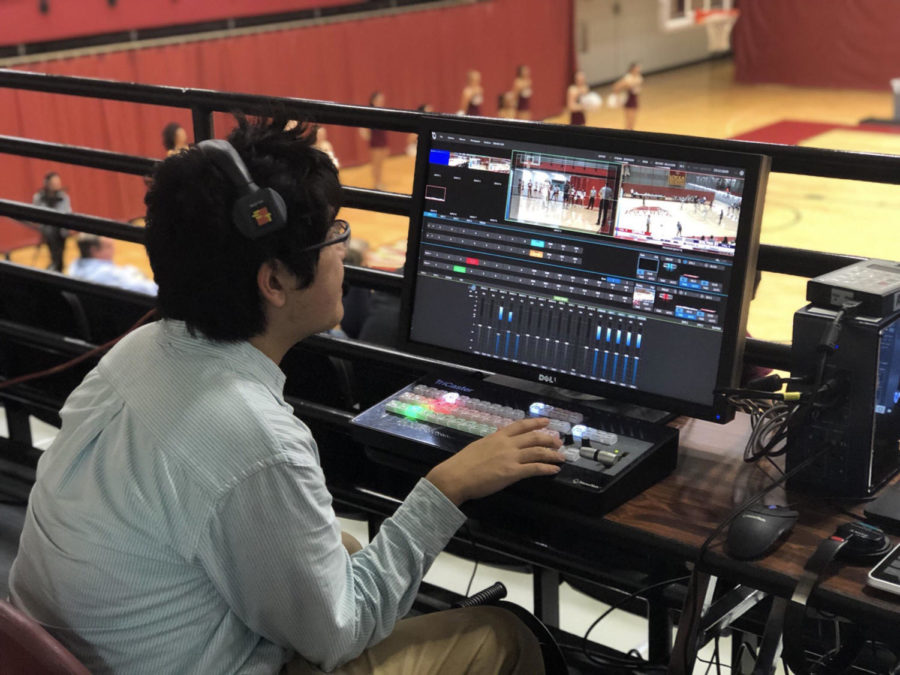Revamped livestreaming is a plus for students and athletes
Mass communication senior Yuri Oguma operates the switcher in The Den during a live broadcast of a basketball game. Photo credit: Albert Dupont
March 21, 2019
As The Den adjusts for the time without any home volleyball or basketball games, the athletic department has a chance to reflect on their first year with a student-run production crew in charge of livestreaming the home games.
Technology coordinator, Albert Dupont, was the mastermind behind all the screens, wires, cameras and microphones that went into every live stream this year.
“I knew that the athletic department needed some help with (the livestream),” Dupont said. “I thought it was a natural fit and a good way to get that experience and hopefully move on to those jobs with freelance at professional.”
Dupont transformed a three-man operation into a full-scale production, with the hope of teaching his students about the ins and outs of production and giving them a taste of what the career entails.
Dupont said, “I’ve had a lot of success in the past with the students getting that experience, they were able to move on to those freelance jobs, even while they were in college. Some even full-time jobs.”
Music industries studies senior Anthony Pontecore was highly in favor of trying out the live production over the course of the year.
“A lot of my early life was spent around cameras, making short films,” Pontecore said. “Having the opportunity to do that on a more professional scale is always a pleasure to part take in. I joined the live-production team to offer what I could to the best of my abilities, but also to better my skill set and have fun.”
Loyola Athletics Director of Communications Mike Swartz was in full support of the production crew for both volleyball and basketball.
“Coming into this summer, reached out to the mass communication department and they were all on board,” Swarttz said.
He said the athletics department realized that the mass comm department is such a big asset to the university by helping its athletes gain more exposure while also providing hands-on production experience for students and Dupont agrees.
Dupont said, “It’s a way to give the students who play athletics good resume material and the people who use it as broadcast good resume material.”
“A lot of players aren’t really from the New Orleans area so it’s kind of hard for their parents to get here, grandparents to get here,” Dupont said. “Hopefully with a quality broadcast where they can see everything, find out what’s going on in the game, and follow the action, they kind of feel like they’re watching it on ESPN or something.”
And while the department couldn’t provide an exact number of livestream views, Swartz said that the viewing numbers are significantly higher this year compared to the previous year.
The new additions to the broadcasts have revamped the live productions of Loyola games and Swartz believes that the project will only continue to grow.
“We’ve got to keep doing what we’re doing and get better at the things we’re already doing,” Swartz said. “We’re definitely looking into adding some more stuff next year.”
Dupont agreed that the first-year trial run went well.
“I think we finished the year good,” Dupont said. “We had a nice crew, we had replays, and when you’re putting up equipment every time and tearing it all down. I think we did ok.”








